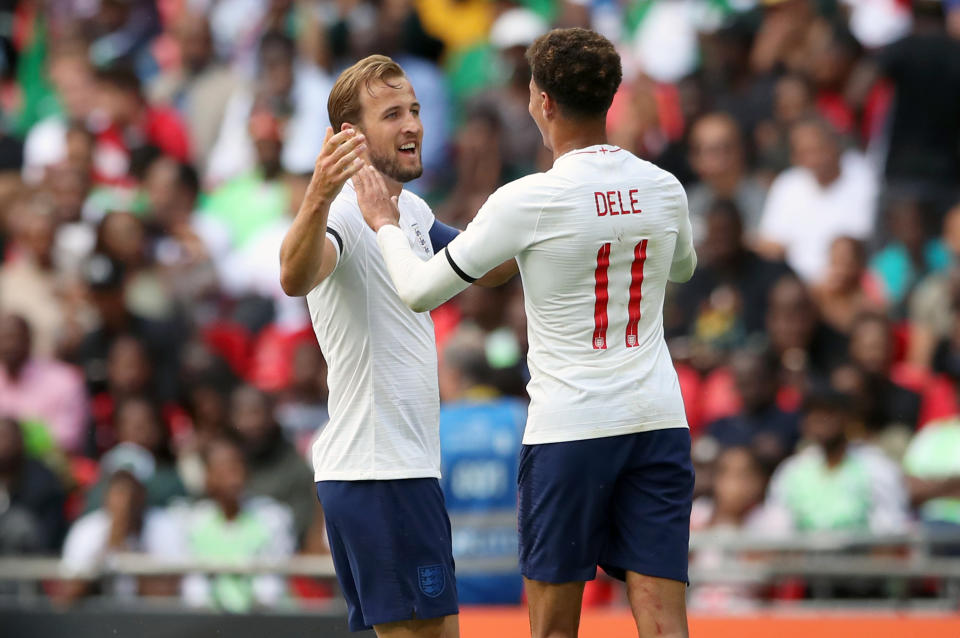This England team is young, but the mounting pre-World Cup hype and pressure are old
The headlines seemed to share something in common.
“Perfect liftoff for Russia,” the Mirror wrote, after it had declared it acceptable if you wanted to “Dare to dream.”
“To Russia with Hope,” the Telegraph chimed in. “Marcus Rashford’s stunning strike gives England perfect World Cup send-off.”
“The perfect send-off!” added the Daily Mail.
Perfect. Perfect. Perfect.
The English papers thought England’s 2-0 friendly victory over a meh Costa Rica 11 days ago in its final preparations for the World Cup was perfect. The fans in Leeds did too, singing their old “Football is coming home” song, implying that the English, codifiers of the modern game, will be winning something.
“Three Lions boss [Gareth] Southgate can’t fail to have been impressed by the hunger, energy and threat of his stars,” the Mirror gushed.
Of the major papers, only the Guardian seemed to have stayed mindful of more than half a century of futility since England won its only major trophy, the 1966 World Cup, in spite of biennial hype you can set your watch to.
“It is probably wise to remember – this being England, after all – that it is never sensible to overdose on optimism before the World Cup actually starts,” it wrote. “Yet there are at least grounds for positivity and increasingly there is a sense that Gareth Southgate’s players are high on confidence, capable of putting together some vibrant football and not showing any obvious signs of the end-of-season fatigue that has weighed them down before major tournaments in the past. Southgate is certainly entitled to be encouraged.”
Days before a World Cup, the English are at it again.

Because they do the same thing before every major tournament. A good-but-not-great edition of the national team delivers a few hopeful performances before a World Cup or Euro and the public and press both convince themselves that things will be different this time around. That the tournament is theirs to lose. Inevitably, it all ends in tears, somewhere between the round of 16 and the quarterfinals. It’s been 22 years since England last reached even the semifinals, after all – at Euro ’96 on home soil.
Now, predictably, the squad has picked up on the cues. “We’re going there to win it. We don’t expect anything less and we’ll be disappointed if we finish second,” star midfielder Dele Alli has said.
“Why would I limit what they feel is possible?” Southgate then echoed, caught in an awkward spot between realism and optimism. “My job is to allow people to dream. Make the impossible seem possible. None of us are going to get excited or get out of bed just for getting out of the group.”
We should probably note here that at the last World Cup, England didn’t make it out of the group stage.
Yet, in truth, there is reason for optimism. England really does have a scintillating young team that doesn’t appear to be as hampered by pressure and bad chemistry as recent incarnations of the team. Alli, Harry Kane and Raheem Sterling are world-class forwards. There is plenty of talent and experience to go around. And Southgate, in spite of being a profoundly unexciting hire in 2016 – after Sam Allardyce had to resign after just one game in charge when he was caught arranging a bribe with undercover journalists – has proved to be a savvy and successful manager, cruising to qualification with eight wins, a pair of ties and no losses.
Yet the immutable fact about England is that it remains incorrigibly English. And for 52 years and 18 World Cups and Euros, not counting the seven England didn’t even qualify for, the Three Lions, so nicknamed, have fallen short of expectations. Insofar as national teams have identities – I’d argue single editions of teams in certain tournaments develop identities, but the big international games are too few and far between to truly develop a unifying personality over the long term – England’s is failure and disappointment.
Tournament after tournament, something seems to happen, where the team crumbles under the expectations and the glare of the unrelenting tabloid press. Often, it’s simply fatigue from the slog of a Premier League season. Not all of England’s current players are regular starters at their clubs though, perhaps alleviating this issue but also dulling their sharpness. But above all, they are mostly so young and new that past failures may not feel particularly relatable to them.
The overwhelming majority of this team was born after England last reached the semifinals at a World Cup, in 1990. Remarkably, in fact, this team has only three players older than 28: Ashley Young, Gary Cahill and Jamie Vardy. And since they are largely in their early to mid-20s, they weren’t around for all those dispiriting eliminations. Just one player has reached 40 caps – Cahill. These weren’t their losses. They watched them on TV.
Which is to say that this English team might not be lumbered with that baggage. Yet the pattern also hasn’t changed. The World Cup is nigh. The hype around England is building. The precedent has long since been set.
Leander Schaerlaeckens is a Yahoo Sports soccer columnist and a sports communication lecturer at Marist College. Follow him on Twitter @LeanderAlphabet.
More World Cup on Yahoo Sports:
• Day 4 winners and losers: Juan Carlos Osorio’s vindication
• Time to panic for Germany after Mexico defeat?
• Mexicans celebrate with tears, a marriage proposal and more
• Brazil struggles to break down Swiss, settles for draw


